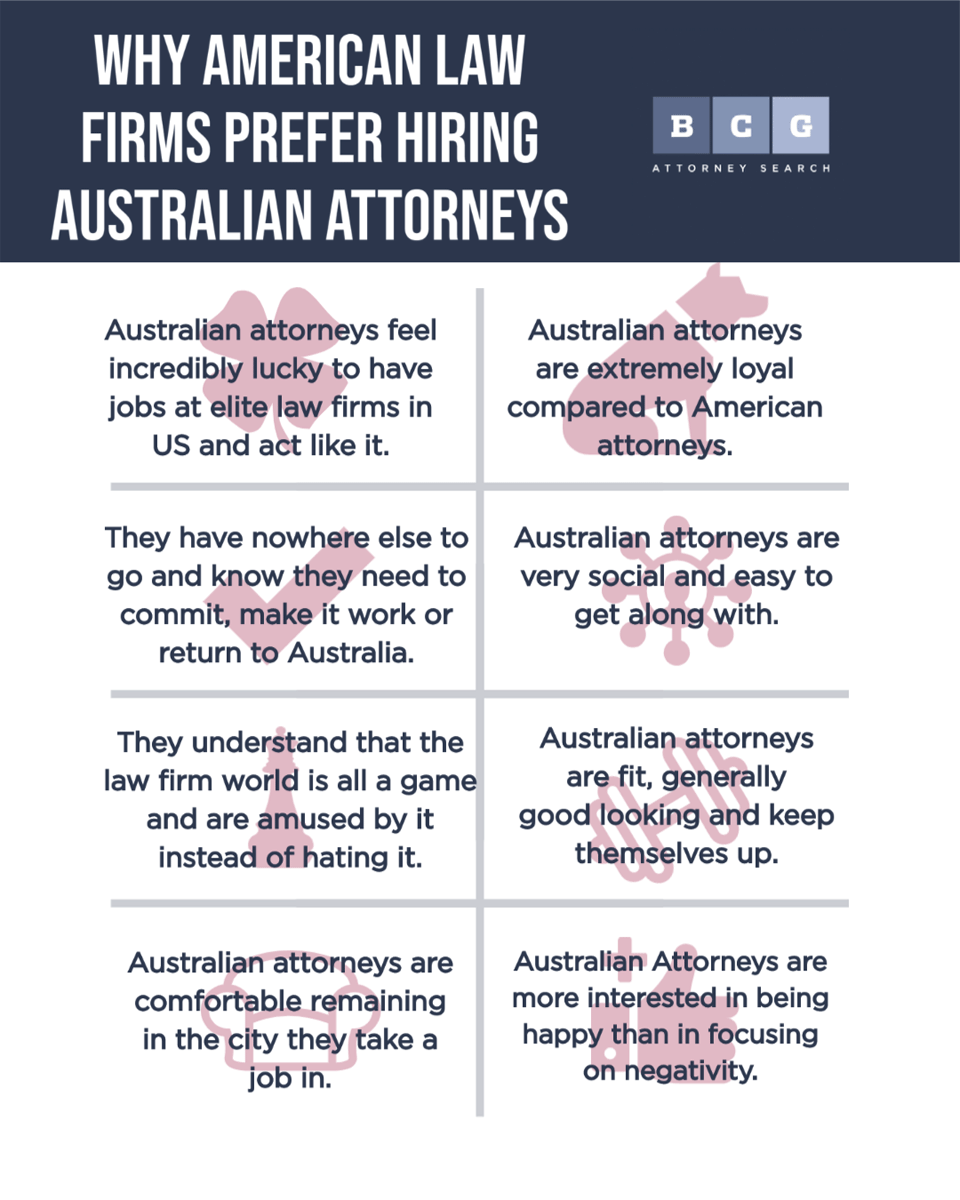- Hiring Aussie attorneys is a trend that has been filtering through American law firms.
- The question is not just why.
- The larger question is what do these Australian lawyers have that American lawyers seem to not have?
Summary: Find out what Australian attorneys do that makes them so attractive to law firms and what lessons you can learn from them.

Whenever the economy is doing well in the United States, American law firms start hiring Australian attorneys. Incredibly, I have seen law firms favor hiring Australian attorneys over American attorneys again and again. I regularly work with Australian attorneys and they almost always get more interviews and more offers than their American counterparts. They get jobs with the best firms. Firms simply love Australian attorneys.

|
| Harrison Barnes |
In contrast, attorneys from Europe, Asia or the Middle East have very little chance of getting hired by a major United States law firm. Scores of Asian and European attorneys come to the United States each year and enroll in American law school LLM programs, yet most do not end up getting positions with American firms. They take the bar, cannot get jobs and then go home. It does not matter if they went to Harvard, Columbia or the University of Chicago—they find themselves right back where they started in most instances. In contrast, virtually every major New York law firm will happily snap up Australian attorneys and the Australian attorneys end up doing very well inside these firms.

You would think, of course, that law firm hiring partners would prefer to hire people from their own countries who have gone to schools they know and have backgrounds that are more similar to theirs. But when it comes to Australian attorneys, this is just not the case!
I frequently speak with European and Asian attorneys who have been let go from law firm jobs; however, I cannot recall ever speaking with an Australian attorney who lost his or her job in an American law firm for performance or personality issues. The only times I can recall Australian attorneys being let go was as part of a mass layoff when corporate departments (where most Australian attorneys work) came to a complete standstill.
After a career of observing Australian attorneys flourish in American law firms, I have come to believe that they are more likely to get jobs and succeed because they offer a combination of traits that law firms appreciate, but that most Americans and people from other countries do not offer. They succeed for the following reasons:
They Feel Incredibly Lucky to Have Jobs at Elite Law Firms in the United States and Act Like It.
Most American attorneys working inside of major law firms are not that excited about it. In fact, they are likely to be unhappy about their jobs and plotting their escapes. This is a stark contrast to Australian attorneys.
Australian attorneys are generally very excited to have jobs in the United States and cannot believe how fortunate they are to be working inside of major American law firms. They feel lucky because they make far, far more money than they would earn in Australian firms and because they have the chance to experience a different culture and country. The thrill of travel is in the bones of most Australians—they love leaving Australia to explore what the world has to offer.
While American attorneys are comparing themselves to people working in hedge funds and attorneys at more prestigious firms, Australian attorneys could often care less about other people. They are here to do the work and are excited about what they have and not worried about something else.
Hiring partners like hiring people who are excited about the job and who are grateful. When an attorney is excited about the job it improves the morale of other people in the office, makes the attorney’s superiors feel good, and looks good to firm clients.
- What is wrong with being excited about a job? Nothing!
- Who would you want working for you? Someone excited about their job!
The average American attorney from an Ivy League law school working at a major law firm is generally a bit down on the circumstances he or she is in—and it shows! Not the average Australian attorney! Australian attorneys succeed and get jobs when American attorneys do not because Australian attorneys are genuinely excited about the opportunity to work wherever they get jobs.
Australian Attorneys Are Extremely Loyal Compared to American Attorneys
I have placed countless Australians in law firm jobs in the United States. Interestingly, these have all been initial jobs; except in cases of mass layoffs, I do not recall ever helping an Australian attorney make a lateral move from one American law firm to another. Switching firms and looking around once they get jobs in the United States is not in the nature of Australian attorneys.
In contrast, the average American attorney is basically “always looking.” If I have 100 “cold call” conversations in a month with prospective American attorneys, these American attorneys are generally “open” to hearing about in-house opportunities, better opportunities with law firms and more. When speaking with them, I rarely hear them say something like, “I feel I owe this place a lot—I am going to do everything I can to stay here and make it work.” This is just not something I hear really at all from American attorneys. Instead of hearing statements of loyalty and gratitude, I hear calculated statements like, “I am up for partner in a year and I want to see what happens…”
Whatever the cultural reasons, American attorneys are very quick to find reasons to be unhappy and switch firms. Here are some recent examples:
- An attorney who made $280,000 a year but whose firm decided to no longer pay $130/month for parking. This University of Chicago Law School graduate was “outraged” by this “affront” and told me that it was the “last straw” after he received a bonus of $10,000 less than he thought he deserved.
- An attorney who noticed “a slowdown” in work and decided to switch firms. This Harvard Law School graduate was concerned that the slowdown meant the firm might collapse.
- An attorney who was in the second year of practice and “had not taken enough depositions” and wanted to go to a firm that would allow more immediate experience.
- An attorney making over $200,000 a year with an international law firm was upset because she had to travel for business a few times a year. This Michigan Law School graduate was at one of the five largest law firms in the United States and was insulted that she needed to spend two weeks in Paris over the summer when she would have preferred to be spending time with her family on the weekends.
- An attorney from Asia at one of the five most prestigious law firms in New York who wanted to go to a more prestigious law firm. This attorney with an LLM from Harvard Law School believed it would “look better” if she worked for a more prestigious law firm. In my belief, the only firms that were arguably more prestigious were Wachtell and Sullivan & Cromwell and she desperately wanted to go there.
- An attorney making $180,000 a year who was upset that a prominent national partner she worked for expected her to stay late when the partner left early. This Stanford Law School graduate thought that she should not be the only one staying late.
- An attorney who thought her firm was “getting boring” and felt it was time to look around. This attorney was at one of the top law firms in the Midwest, but simply wanted a change because she was “bored” with her firm.
These are literally the sorts of reasons many American attorneys start looking around. In contrast, if you cold call an Australian attorney, while that attorney will be quite friendly, the conversation will be quite different. More likely than not the attorney will say something like, “Thanks for calling mate! It sounds like a good opportunity, but I am going to ‘give it a go’ here.” Almost all of them say some version of this statement when you are trying to recruit them. They are much, much more loyal than American attorneys or the average Asian or European attorney.
The Australian attorney may not be incredibly happy in his or her current position, but the attorney’s psychology seems to demand loyalty, because the attorney values his or her firm and the people there. Australian attorneys feel incredibly grateful to have jobs to begin with and, as far as they are concerned, there are not a lot of differences between law firms anyway.
When an attorney is perceived as loyal and grateful, that attorney is more likely to be trusted, advanced and allowed to interact with important clients and others. Many law firms shield attorneys from clients because they are afraid they will say negative things about the firm, try to angle for an in-house job, or even try and steal the clients.
When I am speaking with senior associates without business, generally around half of them will say something like, “I am the one the client deals with the most and if I left I am pretty sure I could get this client and few others to come with me.” I have never heard this sort of thing from an Australian attorney—but most Australian attorneys never look around to begin with and have no interest in biting the hand that feeds them.
The bottom line is that the Australian attorneys are more loyal to their employers when they are in the United States and this loyalty makes them better hires.
Australian Attorneys Have Nowhere Else to Go and Know They Need to Commit, Make It Work or Return to Australia
Because they need to get work visa sponsorship and so forth, once Australian attorneys are hired in the United States it is extremely difficult for them to switch law firms. Law firms generally do not want to go through this hassle. Hiring a lateral attorney from a foreign country from another law firm in the United States is just something American law firms do not do a lot of. Australian attorneys generally get “one shot” and have to make it work.
Australian lawyers know that their odds of lateralling to other firms are quite slim, so they generally commit once they are hired. Commitment is extremely important for attorneys, and this commitment is manifested in how they do assignments, how they get along with peers and how they make efforts to fit in. The level of an attorney’s commitment has a huge impact on the attorney’s success. The more an attorney commits the more the attorney is likely to succeed.
Law firms calculate that hiring an Australian attorney is a good choice because the attorney will have a difficult time making a lateral move anywhere else. Who better to invest your time and training into than someone who is unlikely to leave and cannot go anywhere else? If a law firm had to choose between two attorneys to train and introduce to clients—an attorney who had nowhere else to go or an attorney who was likely to leave—which attorney do you think the law firm would choose?
For Australian attorneys, the alternative to succeeding at their firms in the United States is going home. Once home, they will face far lower salaries, not as sophisticated work, and (for most Australians) a life that is not as exciting as living and working in the United States.
On the other hand, American attorneys have all sorts of alternatives like going to different firms, taking in-house positions, moving to government jobs and so forth. If a law firm hires a graduate of Yale or Harvard Law School right out of school, for example, the firm is generally setting itself up for certain “failure” because all of the time it invests in training and developing this attorney is likely to go to waste; the attorney will simply leave and go to another job. This is not good business for most law firms and they can avoid these problems by hiring Australian lawyers.
Australian Attorneys Are Very Social and Easy to Get Along With
Many American attorneys limit their socializing with colleagues and clients and others in their law firms. American attorneys are often extremely competitive with colleagues and some even hope their colleagues will fail. The other day I spoke with a Columbia Law School graduate who had left a big New York firm after six years and was looking for a $25/hour job answering legal questions on a law information hotline. “Working in a law firm and around those people makes me a bitch!” she said. “All of my friends from law school who are still working are bitches and completely different. I want nothing to do with this anymore.”
The work environment of American law firms generally turns American attorneys into unhappy people, but this does not happen with Australian attorneys. Whatever the negativity of the environment, Australians will generally thrive and uplift those around them. Australian attorneys love socializing and seem continually upbeat and happy.
They work very hard; however, they are also extremely social with colleagues and with each other. There are huge groups of Australian attorneys in New York who are always getting together and having fun. Australians enjoy going out with people from work, enjoy meeting clients and generally enjoy having a very good time with colleagues, clients and others. They always seem to have well-developed and supportive social structures (with other Australians) whereas Americans do not.
This sort of camaraderie is the sort of thing that you generally do not see with American attorneys. American attorneys often avoid other attorneys they work with, as they feel these other attorneys are out to hurt them. Moreover, other attorneys—even from other law firms—are reminders of stressful work and are best avoided.
The idea of having fun, enjoying people from work, seeking companionship, liking other people and wanting to socialize is something that is a good thing in the work environment. Americans often bring each other down. Many attorneys from Asia and Europe will not socialize much either. Europeans working inside American law firms are often quite negative. In contrast, Australians are often bubbling with enthusiasm for socializing.
Law firms are businesses and want people around who raise the morale of others, and who are likely to make clients happy. Australians generally offer all of this and that is why most hiring partners will choose an Australian attorney over an American attorney.
Most Australians Seem to Understand That the Law Firm World Is All a Game and Are Amused By It in Contrast to Having Dark Feelings About It
Instead of taking what goes on inside of law firms personally (the crazy hours, the backstabbing and the competition among attorneys), Australian attorneys are more likely to be amused. Australian attorneys seem to view the “goings on” inside of law firms in an amused and detached way. They understand that there are rules and things that they need to do in order to succeed and they figure out and follow them instead of just viewing them with negativity.
Additionally, because they are so profoundly social as compared to Americans, law firm managers generally view Australian attorneys in a more positive manner and they are less likely to get in trouble with office politics. Moreover, they have access to information from being so social and this information gives them an edge, because knowing what higher ups and others are thinking has profound advantages in a law firm.
While Australian attorneys keep a level head inside these incredibly demanding environments, others are continually quitting, cracking up, going to in-house positions and so forth. Australian attorneys keep on chugging along. The ability to view everything as a game and the people in the law firm as characters in the game makes the law firm an almost humorous place to work for many Australian attorneys. When I speak with Australian attorneys about the dark, demanding environments inside of law firms they are more likely to be laughing about them than getting upset by them.
I have recently started hearing attorneys at major American law firms talk about “human rights” and “the human condition” when talking about their law firm jobs. An Australian attorney would never think like this. Australian attorneys are more easygoing and realize it is just a game. They take their jobs seriously and work hard, but also view the characters in the firm as playing a game. In contrast, most American attorneys are likely to crack under pressure and get psyched out by what is occurring inside of the law firm.
They Are Fit, Generally Good Looking and Keep Themselves Up
This is perhaps not something I should get into because it is likely to piss off a lot of people, but my objective is to point out what makes Australian attorneys succeed. As a general rule, most Australian attorneys are fit and keep themselves up. They seem to take their appearances quite seriously.
Australian attorneys do not get extremely overweight and are generally quite presentable at all times. They do not let themselves go. The numerous Australian attorneys I have worked with are active in sports and in pursuits such as swimming, biking, basketball, tennis and so forth. Many are members of Australian sports leagues in the United States.
Many American attorneys are like this, too, but it is not coincidental that the American attorneys who are active in sports and who exercise also tend to be more successful than those who are not. This is because there is a prejudice in our society in favor of people who are fit and thin. Most actors and actresses make a concerted effort to be fit and thin. The majority of successful executives are fit and thin. Being fit and looking good is something that reflects the idea that if you are able to maintain and look after yourself well then, presumably, this is how you approach your work and other matters as well. Clients want to see people who look good and are kept up because it reflects well on them. Regardless of the political incorrectness of saying this, this is fact. Brands, companies and others want their representatives to look good.
People who are better looking and more physically fit are far more likely to get hired than a similarly positioned attorney who is not. This is important. Australian attorneys are more likely to be fit than their counterparts from America.
When a law firm interviews and hires an Australian attorney, the firm knows that it is getting a “product” that (for the most part) has certain standards for maintenance. American attorneys have these standards too, of course, but Australian attorneys are more likely to be consistent with these standards as a general rule.
They Are Comfortable Remaining in the City They Take a Job In
Many American attorneys who take jobs in cities they are not from end up going home after a few years of practice. For example, a good proportion of American attorneys who begin their careers in New York City do not stay there. In contrast, Australian attorneys seem to rapidly settle down and develop an extensive network of friends, acquaintances and others when they take jobs in a city, and they seem to want to remain in that city. They have few aspirations of moving to another city. This makes the law firms that hire them more secure that they are safe hires and will not jump ship after the firm has spent time and resources training them and introducing them to clients. If an Australian attorney is working in Los Angeles, New York or another city, the law firm has every reason to believe that the attorney will stay there.
Additional Considerations
Some of these have already been mentioned, but the following attributes of Australian attorneys are so important to the reasons why they succeed in American law firms that they deserve additional mention:
- They Are Generally Accepting of Others and More Likely to Look for Commonality than Differences. The average Australian attorney is not overly concerned with class, school pedigree and other statistics Americans take so seriously. They are there to do a good job and that is all that matters. They get along with people and respect them regardless of where they went to school, their race, or their social class. They are accepting and not discriminatory.
- They Are Generally Not Interested in Office Politics. This is something that crushes many attorneys and prematurely ends many careers. Australians, in general, have no use for things that feed unhappiness and are more interested in being happy than in focusing on negativity.
- They Work Hard, but They Moderate Their Pace and Are Not Clock Watchers. Australians work quite hard, but at the same time they know how to look out for their mental and physical health and moderate their work accordingly. They work when they need to and as “team players” and they work without the expectation of an immediate reward.
- They Generally Have Balanced Lives. For the most part, Australians have balanced lives. They work hard, play hard, exercise and have active social lives (with other Australians, Americans and sex partners) outside of work. This balance makes them happy and gives them the energy to contribute inside of law firms.
- They Are Honest and Straightforward. Most Australians are quite honest. They are willing to call out dishonesty and in most cases do not fall on the “dark side” when it comes to covering up and cutting corners. They can be trusted. The ability to be trusted is huge and something law firms and clients appreciate.
- They Are Eager to Please. They approach their work with a high level of enthusiasm and want the people they are working for to appreciate what they do. They are generally eager to please and this makes a major difference in how they are viewed and contributes to their success.
The characteristics that most Australian attorneys display when they move to firms in the United States are the exact sorts of characteristics that would make American attorneys more successful if they displayed these characteristics as well. Attorneys who want to succeed in American law firms can learn a great deal from how Australian attorneys approach the practice of law, the people around them and their work.
If more American attorneys and attorneys from other parts of the world approached their work like the average Australian, they would be more apt to get hired and succeed. There are exceptions to Australians being successful, of course, but the culture seems to produce attorneys uniquely suited to practicing law inside of large law firms.
The market economy always teaches important lessons. Here, the market favors Australians because American firms will interview and hire well credentialed Australians over American, European and Asian attorneys, all things considered. The majority of these jobs are in corporate and the majority of firms are in New York. Nevertheless, I have seen Australian litigators experience profound success in Los Angles and other cities. There are lessons to be learned from people who approach the practice of law a certain way and Australians have a lot to teach about how to succeed in American law firms.
About Harrison Barnes
No legal recruiter in the United States has placed more attorneys at top law firms across every practice area than Harrison Barnes. His unmatched expertise, industry connections, and proven placement strategies have made him the most influential legal career advisor for attorneys seeking success in Big Law, elite boutiques, mid-sized firms, small firms, firms in the largest and smallest markets, and in over 350 separate practice areas.
A Reach Unlike Any Other Legal Recruiter
Most legal recruiters focus only on placing attorneys in large markets or specific practice areas, but Harrison places attorneys at all levels, in all practice areas, and in all locations-from the most prestigious firms in New York, Los Angeles, and Washington, D.C., to small and mid-sized firms in rural markets. Every week, he successfully places attorneys not only in high-demand practice areas like corporate and litigation but also in niche and less commonly recruited areas such as:
- Immigration Law
- Workers Compensation
- Insurance
- Family Law
- Trust and Estate
- Municipal law
- And many more...
This breadth of placements is unheard of in the legal recruiting industry and is a testament to his extraordinary ability to connect attorneys with the right firms, regardless of market size or practice area.
Proven Success at All Levels
With over 25 years of experience, Harrison has successfully placed attorneys at over 1,000 law firms, including:
- Top Am Law 100 firms such including Sullivan and Cromwell, and almost every AmLaw 100 and AmLaw 200 law firm.
- Elite boutique firms with specialized practices
- Mid-sized firms looking to expand their practice areas
- Growing firms in small and rural markets
He has also placed hundreds of law firm partners and has worked on firm and practice area mergers, helping law firms strategically grow their teams.
Unmatched Commitment to Attorney Success - The Story of BCG Attorney Search
Harrison Barnes is not just the most effective legal recruiter in the country, he is also the founder of BCG Attorney Search, a recruiting powerhouse that has helped thousands of attorneys transform their careers. His vision for BCG goes beyond just job placement; it is built on a mission to provide attorneys with opportunities they would never have access to otherwise. Unlike traditional recruiting firms, BCG Attorney Search operates as a career partner, not just a placement service. The firm's unparalleled resources, including a team of over 150 employees, enable it to offer customized job searches, direct outreach to firms, and market intelligence that no other legal recruiting service provides. Attorneys working with Harrison and BCG gain access to hidden opportunities, real-time insights on firm hiring trends, and guidance from a team that truly understands the legal market. You can read more about how BCG Attorney Search revolutionizes legal recruiting here: The Story of BCG Attorney Search and What We Do for You.
The Most Trusted Career Advisor for Attorneys
Harrison's legal career insights are the most widely followed in the profession.
- His articles on BCG Search alone are read by over 150,000 attorneys per month, making his guidance the most sought-after in the legal field. Read his latest insights here.
- He has conducted hundreds of hours of career development webinars, available here: Harrison Barnes Webinar Replays.
- His placement success is unmatched-see examples here: Harrison Barnes' Attorney Placements.
- He has created numerous comprehensive career development courses, including BigLaw Breakthrough, designed to help attorneys land positions at elite law firms.
Submit Your Resume to Work with Harrison Barnes
If you are serious about advancing your legal career and want access to the most sought-after law firm opportunities, Harrison Barnes is the most powerful recruiter to have on your side.
Submit your resume today to start working with him: Submit Resume Here
With an unmatched track record of success, a vast team of over 150 dedicated employees, and a reach into every market and practice area, Harrison Barnes is the recruiter who makes career transformations happen and has the talent and resources behind him to make this happen.
A Relentless Commitment to Attorney Success
Unlike most recruiters who work with only a narrow subset of attorneys, Harrison Barnes works with lawyers at all stages of their careers, from junior associates to senior partners, in every practice area imaginable. His placements are not limited to only those with "elite" credentials-he has helped thousands of attorneys, including those who thought it was impossible to move firms, find their next great opportunity.
Harrison's work is backed by a team of over 150 professionals who work around the clock to uncover hidden job opportunities at law firms across the country. His team:
- Finds and creates job openings that aren't publicly listed, giving attorneys access to exclusive opportunities.
- Works closely with candidates to ensure their resumes and applications stand out.
- Provides ongoing guidance and career coaching to help attorneys navigate interviews, negotiations, and transitions successfully.
This level of dedicated support is unmatched in the legal recruiting industry.
A Legal Recruiter Who Changes Lives
Harrison believes that every attorney-no matter their background, law school, or previous experience-has the potential to find success in the right law firm environment. Many attorneys come to him feeling stuck in their careers, underpaid, or unsure of their next steps. Through his unique ability to identify the right opportunities, he helps attorneys transform their careers in ways they never thought possible.
He has worked with:
- Attorneys making below-market salaries who went on to double or triple their earnings at new firms.
- Senior attorneys who believed they were "too experienced" to make a move and found better roles with firms eager for their expertise.
- Attorneys in small or remote markets who assumed they had no options-only to be placed at strong firms they never knew existed.
- Partners looking for a better platform or more autonomy who successfully transitioned to firms where they could grow their practice.
For attorneys who think their options are limited, Harrison Barnes has proven time and time again that opportunities exist-often in places they never expected.
Submit Your Resume Today - Start Your Career Transformation
If you want to explore new career opportunities, Harrison Barnes and BCG Attorney Search are your best resources. Whether you are looking for a BigLaw position, a boutique firm, or a move to a better work environment, Harrison's expertise will help you take control of your future.
Submit Your Resume Here to get started with Harrison Barnes today.
Harrison's reach, experience, and proven results make him the best legal recruiter in the industry. Don't settle for an average recruiter-work with the one who has changed the careers of thousands of attorneys and can do the same for you.
About BCG Attorney Search
BCG Attorney Search matches attorneys and law firms with unparalleled expertise and drive, while achieving results. Known globally for its success in locating and placing attorneys in law firms of all sizes, BCG Attorney Search has placed thousands of attorneys in law firms in thousands of different law firms around the country. Unlike other legal placement firms, BCG Attorney Search brings massive resources of over 150 employees to its placement efforts locating positions and opportunities its competitors simply cannot. Every legal recruiter at BCG Attorney Search is a former successful attorney who attended a top law school, worked in top law firms and brought massive drive and commitment to their work. BCG Attorney Search legal recruiters take your legal career seriously and understand attorneys. For more information, please visit www.BCGSearch.com.
Harrison Barnes does a weekly free webinar with live Q&A for attorneys and law students each Wednesday at 10:00 am PST. You can attend anonymously and ask questions about your career, this article, or any other legal career-related topics. You can sign up for the weekly webinar here: Register on Zoom
Harrison also does a weekly free webinar with live Q&A for law firms, companies, and others who hire attorneys each Wednesday at 10:00 am PST. You can sign up for the weekly webinar here: Register on Zoom
You can browse a list of past webinars here: Webinar Replays
You can also listen to Harrison Barnes Podcasts here: Attorney Career Advice Podcasts
You can also read Harrison Barnes' articles and books here: Harrison's Perspectives
Harrison Barnes is the legal profession's mentor and may be the only person in your legal career who will tell you why you are not reaching your full potential and what you really need to do to grow as an attorney--regardless of how much it hurts. If you prefer truth to stagnation, growth to comfort, and actionable ideas instead of fluffy concepts, you and Harrison will get along just fine. If, however, you want to stay where you are, talk about your past successes, and feel comfortable, Harrison is not for you.
Truly great mentors are like parents, doctors, therapists, spiritual figures, and others because in order to help you they need to expose you to pain and expose your weaknesses. But suppose you act on the advice and pain created by a mentor. In that case, you will become better: a better attorney, better employees, a better boss, know where you are going, and appreciate where you have been--you will hopefully also become a happier and better person. As you learn from Harrison, he hopes he will become your mentor.
To read more career and life advice articles visit Harrison's personal blog.






